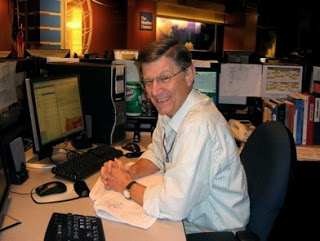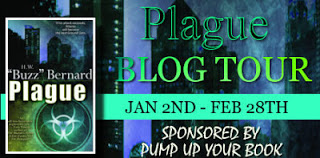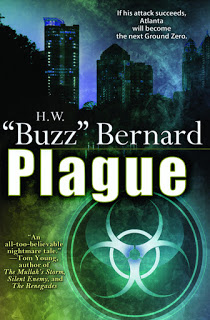H. W. “Buzz” Bernard is a writer and retired meteorologist. His debut novel, EYEWALL, which one reviewer called a “perfect summer read,” was released in May 2011 and went on to become a best-seller in Amazon’s Kindle Store. His second novel, PLAGUE, came out in September 2012. He’s currently at work on his third novel, SUPERCELL.
Before retiring, Buzz worked at The Weather Channel in Atlanta, Georgia, as a senior meteorologist for 13 years. Prior to that, he served as a weather officer in the U.S. Air Force for over three decades. He attained the rank of colonel and received, among other awards, the Legion of Merit. His “airborne” experiences include a mission with the Air Force Reserve Hurricane Hunters, air drops over the Arctic Ocean and Turkey, and a stint as a weather officer aboard a Tactical Air Command airborne command post (C-135).
In the past, he’s provided field support to forest fire fighting operations in the Pacific Northwest, spent a summer working on Alaska’s arctic slope, and served two tours in Vietnam. Various other jobs, both civilian and military, have taken him to Germany, Saudi Arabia and Panama.
He’s a native Oregonian and attended the University of Washington in Seattle where he earned a bachelor’s degree in atmospheric science; he also studied creative writing.
He and his wife Christina live in Roswell, Georgia, along with their fuzzy and sometimes overactive Shih-Tzu, Stormy.
I would like to introduce you to Buzz and I hope you find him as fascinating as I do!
INTERVIEW WITH H.W. “BUZZ” BERNARD
Q: I remember from your author bio that you were a weatherman by trade and training. At what point did you decide to become an author? Was it something that had always been in the back of your mind–like writing short stories in high school/college–or has it been a relatively new idea to fill up idle time in retirement?
A: I knew from the time I was about 8 years old I wanted to be a meteorologist. But I also realized at a very early age I had a talent for writing. I wrote short stories in high school–to some minor acclaim– was sports editor for the school newspaper, and took creative writing courses in college.
I wrote 5 nonfiction books–about weather and climate, of course–between 1979 and 1993.
But it wasn’t until I reached my late 50’s that I decided to venture into writing novels. I discovered making stuff up was a lot easier and a heck of a lot more fun than slogging through reams of data and stacks of research papers to crank out nonfiction.
Oh, and the idea of idle time in retirement is pretty much a myth. At least it seems that way to me. On the other hand, I’m probably not really retired. I’ve pretty much had to give up golf in favor of writing.
Q: Your first novel, EYEWALL, was what one might call a meteorological thriller. Right up your alley. But PLAGUE is about bioterrorism. So it would seem to me you stepped out of your comfort zone to write it. Was it more challenging to do than EYEWALL?
A: Quite a bit. All of my novels are based on fact. As a novelist, I push the factual bases to their limits, but I still want my stories to fall within the realms of possibility. I always tell my readers that Yes, something like what I wrote could occur, but it’s extremely improbable.
Anyhow, PLAGUE did require a good deal of research. Thank God for the Internet and the sites of the CDC [Centers for Disease Control] and the WHO [World Health Organization]. I also read about half a dozen books on the subjects of Ebola and bioterrorism.
Q: Whatever possessed you to write about Ebola and bioterrorism?
A: Ironically, I was inspired by a nonfiction book, Richard Preston’s HOT ZONE, a best seller in the mid-1990s. I became fascinated by the Ebola virus and scared to death by the thought there might be an airborne version of it. Novelists, naturally, love things that scare folks. So, I began thinking about how I could craft all of this into a scary novel.
Q: How long did it take to write PLAGUE?
A: A long time actually. I began writing it in 2003, put it away for awhile to work on EYEWALL, then revived it in 2010. The final version is the product of about 5 rewrites. [PAUSE] You know, maybe I should retract my earlier statement about writing fiction being more fun than writing nonfiction. Nah, it can be a lot of work, but still fun.
Q: I read in one of your blogs you thought PLAUGE should come with a warning label. What was that all about?
A: It was a bit tongue-in-cheek. Death by Ebola is excruciating, and I describe it rather graphically in a couple of scenes in the novel. I want the reader to realize how high the stakes are in the story I spin. Anyhow, my thought was that perhaps there should be a label on the book’s cover cautioning readers that they might not want to read certain passages immediately before, during or after eating.
Q: Robert Frost famously said, “No surprise for the writer, no surprise for the reader.” Were there any surprises for you, as a writer, in PLAGUE?
A: Yes, a big one, actually. About half way through the first draft I got kind of bored with one of the characters–I won’t tell you which one–and got to thinking: What if he or she isn’t who everyone thinks he or she is? So I wrote that deception into the novel and it actually made the story work much better.
Q: What do you think of ebooks? I got to know you as an author because your previous book EYEWALL was listed as a free read on a site I check regularly for my Kindle. When I read the synopsis, I knew I wanted to read it. But, it is likely I may not have noticed it if it wasn’t for the free ebook promotion. Do those promotions really boost your readership?
A: Absolutely, at least in the past. The rise of ebooks and sites like Amazon have leveled the playing field for authors like myself who aren’t with big New York publishing houses and who don’t have huge PR/marketing budgets at their disposal. My publisher, BelleBooks, is extremely savvy when it comes to the rapidly changing landscape of book marketing. With EYEWALL they knew a freebie promotion would be the key to jumpstarting sales.
Ironically, the landscape is changing so rapidly that giveaways and discount promos no longer work that well. So, for PLAGUE, BelleBooks is relying on special promotions generated directly by the big book outlets, like Amazon. But that means we have to wait for the novel to be selected, as opposed to initiating promos ourselves. The entire process is slower, but, we hope, more rewarding in the end.
Q: What has been the best part for you about being a published author? Is it seeing your book on Amazon or in a bookstore? Is it being recognized by fans? Is it the extra padding in your retirement income? Or something else entirely?
A: I think the answer is Something else entirely. There was a point in my writing career, at least during my attempt to become a novelist, when I thought I would never get published. I gave up dreams of fame and fortune. I just wanted to prove I could be a commercially published novelist. It became a challenge, almost an obsession. When I finally saw EYEWALL in print, it was almost anti-climatic–I was pretty much drained emotionally. But I did feel I’d proved something, that I’d won a battle, beaten the odds.
Q: So what’s next and when will we see it?
A: I’m going back to my roots, I’d guess you’d say. I’m currently working on a novel, SUPERCELL, set against a background of tornado chasing on the Great Plains. My plan, assuming my publisher likes the book, is to release it in conjunction with the start of the 2014 tornado season.
Thanks to Buzz for his time in answering these questions and now for all the information on his new book, PLAGUE.
PLAGUE
By: H.W. “Buzz” Bernard
Published: September 4, 2012
Deep in the secret recesses of a Cold War lab, the Russians created tons of deadly bio-weapons. Now, decades later, a protege of that Russian research is about to release weaponized Ebola into the heart of the South’s most iconic city: Atlanta, where the symbols of American “decadence” range from a happily diverse population to the Coca-Cola museum and CNN headquarters.
A preliminary test of the horrifying virus demonstrates the unspeakable suffering of its victims–and alerts the Centers for Disease Control that a terrible pandemic is in the making. CDC Virologist Dr. Dwight Butler begins a frantic effort to track down the source of the virus before it’s too late.
For new BioDawn CEO Richard Wainwright, it quickly becomes clear that the “accidental” plane crash that killed the pharmaceutical company’s entire executive hierarchy may have some connection to the evolving threat. Suddenly, Richard is being stalked by a hit woman. He and Butler join forces to find the lone terrorist at the center of a plan that could unleash the Black Plague of the 21st century.
To connect with H.W. “Buzz” Bernard:
To purchase PLAGUE, click the photo below:






